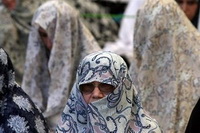US Considering New Penalties against Iran
Thursday President Barack Obama said that the U.S. and its allies are discussing possible new sanctions against Iran for defying international attempts to halt its contested nuclear program.

Obama's warning came after Iran rejected a compromise proposal to ship its low-enriched uranium abroad so that it could not be further enriched to make weapons. Talk of fresh sanctions also showed that Obama is preparing for the next phase should Iran fail to meet his year-end deadline for progress in negotiations.
"They have been unable to get to `yes', and so as a consequence, we have begun discussions with our international partners about the importance of having consequences," Obama said at a news conference with South Korean President Lee Myung-bak.
"Our expectation is, is that over the next several weeks we will be developing a package of potential steps that we could take that will indicate our seriousness to Iran," The Associated Press reports.
Meanwhile, representatives from major world powers will meet in Brussels Friday to discuss developments with Iran's nuclear programme, EU foreign policy chief Javier Solana's office said Thursday.
"I can confirm to that tomorrow in Brussels there will be a meeting of the three plus three at the level of political directors, hosted by the European Union," Solana's spokeswoman said.
Permanent UN Security Council members Britain, China, France, Russia and the United States, plus Germany -- the so-called three plus three group -- are leading talks aimed at persuading Iran to curb its nuclear ambitions, AFP reports.
In the meantime, France has rejected Tehran's latest proposal for exchanging its low-grade nuclear fuel with higher enriched uranium in a simultaneous swap inside the country.
French Foreign Ministry Spokesman Bernard Valero said that France "will not touch on the technical issues" of the offer to provide fuel for a nuclear research reactor in Tehran.
The statement came one day after Iran's Foreign Minister Manouchehr Mottaki said that although Iran would not send its 3.5-percent-enriched uranium out of the country for further reprocessing, it would still be willing to consider the nuclear fuel deal if the conditions of the procedural transfer were changed.
The deal, drawn up by the International Atomic Energy Agency (IAEA) after talks with Iran, the US, France and Russia in Vienna last month, proposes an exchange of Iran's low-grade uranium (enriched up to 3.5 percent) with fuel processed to higher levels of around 20 percent enrichment.
Valero also noted that talks could continue with the Islamic Republic over its nuclear drive, PRESS TV reports.
Subscribe to Pravda.Ru Telegram channel, Facebook, RSS!


